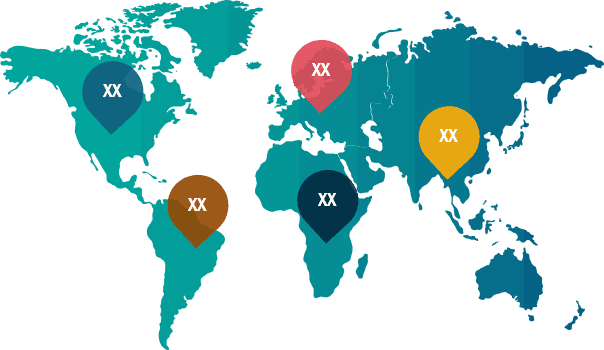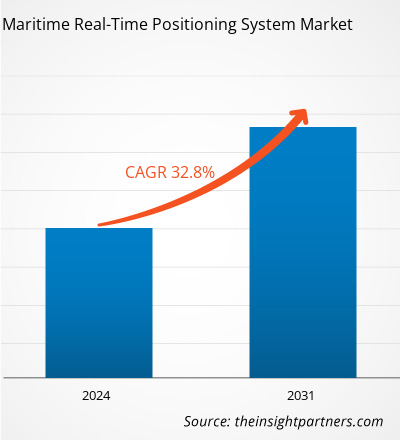海上リアルタイム測位システムの市場規模は、2023 年の 4 億 6,981 万米ドルから 2031 年までに 4 億 3,719 万米ドルに達すると予測されています。市場は 2023 ~ 2031 年に 32.8% のCAGRを記録すると予想されています。海域での違法行為を最小限に抑える必要性と世界的な海上貿易の成長は、今後も海上リアルタイム測位システム市場の動向の鍵となると考えられます。
海上リアルタイム測位システム市場分析
RFID、GPS、Wi-Fi 、Bluetoothなどの高度な技術をナビゲーションや監視に使用することで、船舶所有者や海洋機関は海域での違法行為を防止できます。高度なソリューションを使用すると、大型船舶の所有者が船舶に関するリアルタイム情報を取得できるようになり、海上リアルタイム測位システムの需要が高まります。世界貿易の高まりと海洋産業のデジタル化は、海上リアルタイム測位システム市場の成長にさらに貢献しています。
海上リアルタイム測位システム市場概要
海事業界全体でのデジタル化の進展に伴い、船舶、船舶、コンテナの位置を追跡および監視するためにリアルタイム測位システムが広く採用されています。 GPS やRFIDなどのテクノロジーを使用して、船舶やコンテナに関するリアルタイムの情報を取得します。世界貿易の増加に伴い、政府は海事リアルタイム測位システム市場をさらに推進する技術的に進んだソリューションの導入など、海事産業の強化に注力しています。
要件に合わせてリサーチをカスタマイズ
当社の標準製品では満たされない分析と範囲を最適化し、調整することができます。この柔軟性により、事業計画や意思決定に必要な正確な情報を得ることができます。
海上リアルタイム測位システム市場:

CAGR (2023 - 2031)32.8%- 2023年の市場規模
4億6,981万米ドル - 市場規模 2031 年
45 億 3,719 万米ドル

市場動向
- 海運業界におけるRFIDテクノロジーの利用の拡大
- 海上貿易の隆盛
- AIベースのリアルタイム測位システム
キープレーヤー
- ディメクAS
- Envision Enterprise Solutions America Inc.
- ファベンドGmbH
- イントラシス (Pte.) Ltd.
- マーテックマリン
- MERグループ
- 株式会社オーブコム
- Shipcom Wireless Inc
- ベクター インフォテック Pte Ltd.
- ゼブラテクノロジーズ株式会社
地域概要

- 北米
- ヨーロッパ
- アジア太平洋地域
- 中南米
- 中東とアフリカ
市場セグメンテーション
 成分
成分- ハードウェア
- ソフトウェア
- サービス
 テクノロジー
テクノロジー- RFID
- GPS
- その他
 応用
応用- フリート管理
- 在庫と資産の管理
- 乗組員の追跡
 容器の種類
容器の種類- 漁船
- 貨物船
- サービス船
- 旅客船とフェリー
- その他
- サンプル PDF では、コンテンツの構造と情報の性質を定性的および定量的分析で紹介します。
海上リアルタイム測位システム市場の推進力と機会
市場を有利にするために海運業界でのRFIDテクノロジーの使用が拡大
RFID測位では、電波を使用して、輸送用コンテナに取り付けられたRFIDタグの位置または場所を特定します。RFID追跡は、マイクロチップとアンテナで構成される RFID コンテナ タグを使用して実行されます。輸送用コンテナに取り付けられた RFID タグは、RFID リーダーで検出可能な無線周波数信号を発します。リーダーはタグから一意の識別子を抽出して処理および分析します。 RFID 固定リーダーとアンテナは、港、倉庫、配送センターなどのコンテナを追跡するために、サプライ チェーンに沿ったさまざまなポイントに設置されています。コンテナがこれらのチェックポイントを通過すると、RFID タグがスキャンされ、データがリアルタイムで更新されるため、企業はコンテナの位置と状態を追跡できます。
海上貿易の隆盛
海上輸送は国際貿易と世界経済の基盤です。国連貿易開発会議 (UNCTAD) の 2023 年の海上輸送に関するレビューによると、海上貿易は 2024 年から 2028 年の間に 2% 以上成長すると予想されています。さらに、OECD によると、世界的な貨物需要の増加により、海上貿易量は 2050 年までに 3 倍に増加すると予想されています。海上貿易の増加により、海上貿易業務全体を強化するための船舶および船舶の効率的な航行および追跡システムの需要が発生します。したがって、海上を介した貿易活動の増加は、海上リアルタイム測位システム市場に大きな成長の機会を生み出すでしょう。
海上リアルタイム測位システム市場レポートのセグメンテーション分析
海上リアルタイム測位システム市場分析の導出に貢献した主要なセグメントは、コンポーネント、技術、アプリケーション、船舶の種類です。
- コンポーネントごとに、市場はハードウェア、ソフトウェア、サービスに分類されます。 2023 年にはハードウェア部門がより大きな市場シェアを獲得しました。
- 技術に基づいて、市場はRFID、GPSなどに分類されます。 GPS セグメントは 2023 年にさらに大きな市場シェアを獲得しました。
- 市場はアプリケーションごとに、フリート管理、在庫および資産管理、乗務員追跡に分類されます。在庫と資産管理は、最高の CAGR で成長すると予想されます。
- 船舶の種類に基づいて、市場は漁船、貨物船、業務用船舶、旅客船およびフェリーなどに分類されます。貨物船セグメントは最も高い CAGR で成長すると予想されます。
地理別海上リアルタイム測位システム市場シェア分析
海上リアルタイム測位システム市場レポートの地理的範囲は、主に北米、アジア太平洋、ヨーロッパ、中東およびアフリカ、南米/中南米の5つの地域に分かれています。
収益の点では、2023 年には北米が海上リアルタイム測位システム市場で最大のシェアを占め、次いでヨーロッパ、アジア太平洋地域となりました。アジア太平洋地域は最も高い CAGR で成長すると予想されます。北米地域における多数の市場プレーヤーの存在は、この地域の市場の成長につながります。この地域は、北米の海上リアルタイム測位システム市場の成長に貢献する、技術的に進んだソリューションを早期に導入した地域です。
海上リアルタイム測位システム市場レポートの範囲
| レポート属性 | 詳細 |
|---|---|
| 2023年の市場規模 | 4億6,981万米ドル |
| 2031年までの市場規模 | 45億3,719万米ドル |
| 世界の CAGR (2023 ~ 2031) | 32.8% |
| 歴史的なデータ | 2021-2022 |
| 予測期間 | 2024~2031年 |
| 対象となるセグメント | コンポーネント別
|
| 対象となる地域と国 | 北米
|
| 市場のリーダーと主要な企業概要 |
|
- サンプル PDF では、コンテンツの構造と情報の性質を定性的および定量的分析で紹介します。
海上リアルタイム測位システム市場のニュースと最近の動向
海上リアルタイム測位システム市場は、重要な企業出版物、協会データ、データベースなどの一次および二次調査後の定性的および定量的データを収集することによって評価されます。以下は市場の発展のリストです。
- UNCTADの2022年海上輸送レビューによると、アジアは2021年も依然として世界有数の海上貨物取扱センターであり、輸出の42%、輸入の64%を占めている。 2021 年には、コンテナ貿易全体の約 40% が、アジア、ヨーロッパ、米国を結ぶ主要な東西ルートで占められていました。南アジア・地中海など本線以外の東西路線は12.9%を占めた。 (出典: UNCTAD、プレスリリース、2022 年)
- 2023年の港湾・海運・水路省の年末総括によると、首相はインドの「ブルーエコノミー」を支える物流、インフラ、海運における願望を包括する「海洋アムリット・カール・ビジョン2047」を打ち出した。インドの海事セクターは、80,000億ルピーの投資を伴うグローバル海事インドサミット中に発表された包括的なロードマップによって変革を遂げようとしています。 (出典: 港湾海運水路省、プレスリリース、2024 年)
海上リアルタイム測位システム市場レポートの対象範囲と成果物
「海上リアルタイム測位システム市場規模と予測(2021年から2031年)」レポートは、以下の分野をカバーする市場の詳細な分析を提供します。
- 対象となるすべての主要市場セグメントの世界、地域、国レベルでの市場規模と予測
- 推進要因、抑制要因、主要な機会などの市場ダイナミクス
- 将来の主要なトレンド
- 詳細な PEST/ポーターの 5 つの力と SWOT 分析
- 主要な市場動向、主要企業、規制、最近の市場動向をカバーする世界および地域の市場分析
- 市場の集中、ヒートマップ分析、著名なプレーヤー、最近の動向をカバーする業界の状況と競合分析
- 詳しい会社概要
- 過去2年間の分析、基準年、CAGRによる予測(7年間)
- PEST分析とSWOT分析
- 市場規模価値/数量 - 世界、地域、国
- 業界と競争環境
- Excel データセット



Report Coverage
Revenue forecast, Company Analysis, Industry landscape, Growth factors, and Trends

Segment Covered
This text is related
to segments covered.

Regional Scope
North America, Europe, Asia Pacific, Middle East & Africa, South & Central America

Country Scope
This text is related
to country scope.
よくある質問
The global maritime real-time positioning system market was estimated to be US$ 469.81 million in 2023 and is expected to grow at a CAGR of 32.8% during the forecast period 2023 - 2031.
The need to minimize illegal activities in waters and the growth in the global maritime trade are the major factors that propel the global maritime real-time positioning system market.
AI-based real time positioning system is anticipated to play a significant role in the global maritime real-time positioning system market in the coming years.
The key players holding majority shares in the global maritime real-time positioning system market are DIMEQ AS, Envision Enterprise Solutions America Inc., Favendo GmbH, Martek Marine, and Orbcomm Inc.
The global maritime real-time positioning system market is expected to reach US$ 4537.19 million by 2031.
The incremental growth expected to be recorded for the global maritime real-time positioning system market during the forecast period is US$ 4067.38 million.
Trends and growth analysis reports related to Electronics and Semiconductor : READ MORE..
The Insight Partners performs research in 4 major stages: Data Collection & Secondary Research, Primary Research, Data Analysis and Data Triangulation & Final Review.
- Data Collection and Secondary Research:
As a market research and consulting firm operating from a decade, we have published and advised several client across the globe. First step for any study will start with an assessment of currently available data and insights from existing reports. Further, historical and current market information is collected from Investor Presentations, Annual Reports, SEC Filings, etc., and other information related to company’s performance and market positioning are gathered from Paid Databases (Factiva, Hoovers, and Reuters) and various other publications available in public domain.
Several associations trade associates, technical forums, institutes, societies and organization are accessed to gain technical as well as market related insights through their publications such as research papers, blogs and press releases related to the studies are referred to get cues about the market. Further, white papers, journals, magazines, and other news articles published in last 3 years are scrutinized and analyzed to understand the current market trends.
- Primary Research:
The primarily interview analysis comprise of data obtained from industry participants interview and answers to survey questions gathered by in-house primary team.
For primary research, interviews are conducted with industry experts/CEOs/Marketing Managers/VPs/Subject Matter Experts from both demand and supply side to get a 360-degree view of the market. The primary team conducts several interviews based on the complexity of the markets to understand the various market trends and dynamics which makes research more credible and precise.
A typical research interview fulfils the following functions:
- Provides first-hand information on the market size, market trends, growth trends, competitive landscape, and outlook
- Validates and strengthens in-house secondary research findings
- Develops the analysis team’s expertise and market understanding
Primary research involves email interactions and telephone interviews for each market, category, segment, and sub-segment across geographies. The participants who typically take part in such a process include, but are not limited to:
- Industry participants: VPs, business development managers, market intelligence managers and national sales managers
- Outside experts: Valuation experts, research analysts and key opinion leaders specializing in the electronics and semiconductor industry.
Below is the breakup of our primary respondents by company, designation, and region:

Once we receive the confirmation from primary research sources or primary respondents, we finalize the base year market estimation and forecast the data as per the macroeconomic and microeconomic factors assessed during data collection.
- Data Analysis:
Once data is validated through both secondary as well as primary respondents, we finalize the market estimations by hypothesis formulation and factor analysis at regional and country level.
- Macro-Economic Factor Analysis:
We analyse macroeconomic indicators such the gross domestic product (GDP), increase in the demand for goods and services across industries, technological advancement, regional economic growth, governmental policies, the influence of COVID-19, PEST analysis, and other aspects. This analysis aids in setting benchmarks for various nations/regions and approximating market splits. Additionally, the general trend of the aforementioned components aid in determining the market's development possibilities.
- Country Level Data:
Various factors that are especially aligned to the country are taken into account to determine the market size for a certain area and country, including the presence of vendors, such as headquarters and offices, the country's GDP, demand patterns, and industry growth. To comprehend the market dynamics for the nation, a number of growth variables, inhibitors, application areas, and current market trends are researched. The aforementioned elements aid in determining the country's overall market's growth potential.
- Company Profile:
The “Table of Contents” is formulated by listing and analyzing more than 25 - 30 companies operating in the market ecosystem across geographies. However, we profile only 10 companies as a standard practice in our syndicate reports. These 10 companies comprise leading, emerging, and regional players. Nonetheless, our analysis is not restricted to the 10 listed companies, we also analyze other companies present in the market to develop a holistic view and understand the prevailing trends. The “Company Profiles” section in the report covers key facts, business description, products & services, financial information, SWOT analysis, and key developments. The financial information presented is extracted from the annual reports and official documents of the publicly listed companies. Upon collecting the information for the sections of respective companies, we verify them via various primary sources and then compile the data in respective company profiles. The company level information helps us in deriving the base number as well as in forecasting the market size.
- Developing Base Number:
Aggregation of sales statistics (2020-2022) and macro-economic factor, and other secondary and primary research insights are utilized to arrive at base number and related market shares for 2022. The data gaps are identified in this step and relevant market data is analyzed, collected from paid primary interviews or databases. On finalizing the base year market size, forecasts are developed on the basis of macro-economic, industry and market growth factors and company level analysis.
- Data Triangulation and Final Review:
The market findings and base year market size calculations are validated from supply as well as demand side. Demand side validations are based on macro-economic factor analysis and benchmarks for respective regions and countries. In case of supply side validations, revenues of major companies are estimated (in case not available) based on industry benchmark, approximate number of employees, product portfolio, and primary interviews revenues are gathered. Further revenue from target product/service segment is assessed to avoid overshooting of market statistics. In case of heavy deviations between supply and demand side values, all thes steps are repeated to achieve synchronization.
We follow an iterative model, wherein we share our research findings with Subject Matter Experts (SME’s) and Key Opinion Leaders (KOLs) until consensus view of the market is not formulated – this model negates any drastic deviation in the opinions of experts. Only validated and universally acceptable research findings are quoted in our reports.
We have important check points that we use to validate our research findings – which we call – data triangulation, where we validate the information, we generate from secondary sources with primary interviews and then we re-validate with our internal data bases and Subject matter experts. This comprehensive model enables us to deliver high quality, reliable data in shortest possible time.

 このレポートの無料サンプルを入手する
このレポートの無料サンプルを入手する